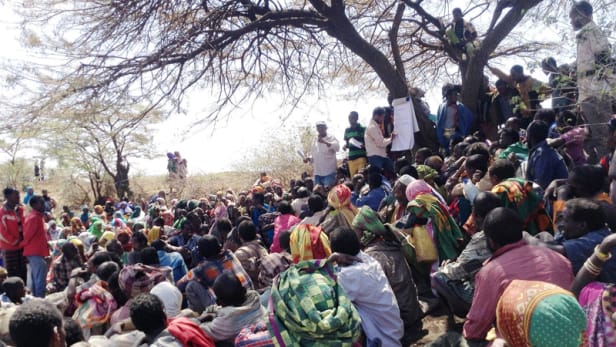By Lisa Cornish
 |
| Men and women community members are engaged in the participatory disaster risk assessment in Ethiopia. Photo by: USAID in Africa |
President Donald Trump has hit hard at climate funding with calls in his draft budget for the U.S. to withdraw from all U.N. climate change programs, including the Green Climate Fund and Climate Investment Funds.
For aid programs specifically addressing issues associated with climate change, a cloud may now be hanging over their future. With a 28 percent cut proposed for the United States Agency for International Development, climate programs could be lost in the first round of cuts.
Following Australia’s first budget under former Prime Minister Tony Abbott, Australia similarly saw climate change shifted off the agenda. Its impact on the aid budget saw climate change downplayed as a priority, with terms trickling into programs associated with natural disasters, food security and agriculture.
The impact of the U.S. decision, which essentially denies the global challenges of climate change, will be dramatically felt in African nations suffering from drought and famine and Pacific Island nations disappearing under rising the rising sea level.
Unless climate programs are reframed. Here’s how.
From climate adaption to disaster resilience
For Pacific Island countries, climate adaption can include preparing for the increasing onset of natural disasters by building infrastructure, response systems and strategies. It can also include preparing communities with health-related training and equipment to save lives following a natural disaster.
The concern of not investing in these program is that unprepared communities will see loss of life and more money will be required to help them to recover. These are important programs to continue.
By reframing climate adaptation programs as disaster resilience programs, the conversation can change to responding to natural disasters in a cheaper and more effective manner — before the disaster hits and large sums of money are required as part of a humanitarian response.
From clean energy and low emissions to economical living
An important component of the aid program is clean energy projects focused on delivering solar and renewable power, services, and technology to people living in remote and rural communities.
A key factor in the success of these programs is not only their ability to deliver green solutions, but their approach to delivering critical infrastructure without building large systems delivering to entire regions or countries.
And they are important in building agricultural capability, empowering women, creating strong economies and building future trading partners.
The economic feasibility of these programs may be an important factor in maintaining them in the long and short term.
From climate science to knowledge sharing
While there will never be a replacement for direct funds to countries, adjusting scientific programs that encourage knowledge sharing could reduce program budgets while building capacity in developing countries.
Monitoring carbon emissions, mapping forests and monitoring changes to flora and fauna requires specialized knowledge that should exist within a developing country for sustainability of a program.
It is not only financially beneficial but can create ongoing mentoring networks maintained after programs end.
A focus on food security and building agriculture markets
The ability to feed future populations is directly linked to farming communities adapting to changing climate and environmental conditions. But if we keep climate out of it, we can focus purely on the ability to deliver new approaches and measures to generate higher yield from crops and produce nutritious options to prevent a range of diseases, including those associated with obesity.
Increasing yield and the quality of outputs not only improves the ability to feed global populations, it builds agricultural markets and stronger economies in developing countries.
Food security programs, meanwhile, not only secure future food needs of developing countries, but also of Americans.
Link programs to global and regional stability
For a president strong on security at home, there is convincing research to link climate-related development issues to social, economic and political instability, which can also build ferment.
Reframing climate programs to link their operations to reducing instability and improving safety of Americans may get the positive attention it needs.
In the end, climate change programs can achieve a lot, and changing terminology and key phrases may mean the difference between programs being maintained or cut in the predicted aid budget slash.

No comments:
Post a Comment